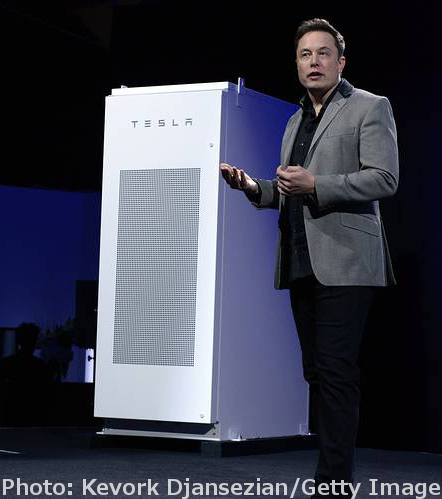Tesla heads home for new energy revolution
 Tech firm Tesla is making a foray into the commercial energy market, with a series of new batteries designed to store energy at the home, business and utility scale.
Tech firm Tesla is making a foray into the commercial energy market, with a series of new batteries designed to store energy at the home, business and utility scale.
Tesla is repackaging the lithium ion batteries it uses in its electric cars to sell them as electricity-storage devices for building of all sizes.
The idea is fairly simple - the batteries absorb electricity at off-peak times when it is cheap and plentiful, and during a sunny afternoon on a house with rooftop solar panels - and release power when electricity is most expensive.
Elon Musk, the company’s chief executive, said Tesla is “trying to change the fundamental energy infrastructure of the world.”
The idea is not new – most homes with a solar array on the roof have some sort of storage to supply power when the sun is not out.
In fact, many companies already sell what are known as flow batteries, which are common for large users like utilities.
“So many companies are fighting over a market that’s practically nonexistent right now,” says Haresh Kamath, energy storage expert at the Electric Power Research Center in Palo Alto, California.
“Tesla is betting they can produce a charismatic product that consumers will want to buy - like what Apple did with the iPhone.”
Tesla plans to offer a 7 kilowatt-hour system for $US3,000 and a 10 kilowatt-hour battery pack for $US3,500.
Analysts say the average house has electrical demands of about 2 to 5 kilowatts, meaning the packs could power an entire house unaided for a couple of hours.
“The big catch will be decreasing the costs,” says Venkat Srinivasan, head of the battery program at Lawrence Berkeley National Lab.
Srinivasan said battery prices would need to drop by about 75 per cent before home-scale storage can become mainstream.
Tesla says it has an answer for that, with plans for a giant battery factory underway that could 30 per cent off the cost of producing batteries.
Across the electricity industry, storage has become the major hitch preventing the rise of renewable energy.
With developments such as those happening at Tesla, the future of non-polluting power systems looks a little bit clearer, and brighter.








 Print
Print